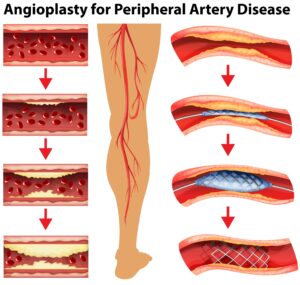Are you wondering, when should I treat PAD? This read is for you because, if you’re showing symptoms of Peripheral Arterial Disease (PAD), you may be scared. Chances are you’re experiencing symptoms such as leg cramps when you walk, changes in skin color, cold or numb feet, or even ulcers.
Still, you need to understand that PAD poses a very serious risk to your health. In fact, studies show that having PAD is one of the strongest predictors for cardiovascular diseases such as heart attacks and strokes (your risk for these conditions increases by as much as 80% when you have PAD.) Yet, according to this study, PAD patients are less likely to be prescribed statins, medications that could reduce the risk for cardiovascular complications. In other words, it’s not something you ignore, or even delay addressing. Want to learn more? Just keep reading!
It's important to seek PAD treatment as soon as you notice symptoms. The most common symptom of PAD is leg cramps (claudication). They tend to appear when you're walking or exercising, and improve when you rest.
But other symptoms of PAD include having cold feet. Now, in some cases, having cold feet and hands just means your blood flow is compromised. Other times, however, having cold feet could be a sign that narrowed arteries are restricting blood flow to your extremities. If that's the case, you should seek arterial care right away, to lower your risk for unhealing infections and even limb loss.
Cardiovascular disease impacts your heart and blood vessels. It takes many forms, including atherosclerosis (narrowing of your arteries due to the build-up of ‘plaque.’) But, basically, it encompasses four main conditions: strokes, aortic disease, coronary heart disease, and peripheral arterial disease. Cardiovascular disease is very serious. It is still the leading cause of death in the United States.

In order to really reduce your risk for cardiovascular problems, participants needed to follow the American Heart Association's 7 measures for good heart health. They involving maintaining healthy cholesterol, blood sugar, and blood pressure levels. You should also exercise regularly, maintain a healthy weight, follow a healthy diet and avoid or quit smoking.
Now, each of these seven measures is equally important. So doing just one is obviously better than nothing; but they have the highest heart-protecting power when they work together.
In other words, if you’re still deciding when to treat your PAD, the answer is: right now. Because even minimally-invasive PAD treatment offer lasting relief.
Findings presented at the American Heart Association’s Scientific Sessions 2022 reveal that restoring blood flow with an arterial stent or balloon angioplasty reduces pain and improves quality of life for patients with PAD. (We offer both these endovascular treatments in our Dallas, Houston, Katy, Sugar Land, Clear Lake and Woodlands locations.)
In contrast, a statement from the American Heart Association says that the quality-of-life toll that PAD takes on your daily life “cannot be overstated.” And the impact isn't just one you'll feel in the short-term. Why is that the case?
Once atherosclerosis limits blood flow to your legs, that’s already a sign you’ve got cardiovascular problems. And that means you’re on the road to more serious complications, unless you seek intervention. So, before you get stuck in the traffic jam leading to strokes or heart attacks, take a detour to better health.
Need help finding that off-ramp? Request an appointment with our Houston and Dallas area PAD specialists. We are here to offer timely diagnoses and treatment plans.
Findings presented at the American Heart Association’s Scientific Sessions 2022 reveals that restoring blood flow with an arterial stent or balloon angioplasty reduces pain and improves quality of life for patients with PAD. (We offer both these endovascular treatments in our Houston, Katy, Sugar Land, Clear Lake and the Woodlands locations.)
Recent medical advancements mean that there are now dissolving stents that can safely be absorbed by the body, reducing the risk of recurring blockages that can happen if you remove an angioplasty balloon. At the same time, it can help prevent future procedures. And, while not yet available widely, early research in the New England Journal of Medicine suggests this option could dramatically improve quality of life.
In contrast, a statement from the American Heart Association says that the quality of life toll that PAD takes on your daily life “cannot be overstated.” And the impact isn't just one you'll feel in the short-term. Why is that the case?
Once atherosclerosis limits blood flow to your legs, that’s already a sign you’ve got cardiovascular problems. And that means your car’s on the road to more serious complications. So, before you get stuck in the traffic jam leading to strokes or heart attacks, take a detour to better health.
Need help finding that off-ramp? Request an appointment with our Houston and Dallas area PAD specialists today. We are here to offer timely PAD treatment.
Source Page: https://texaseva.com/sources/

Scheduling
Please contact our dedicated specialists to schedule a consultation today.
2025 Texas Endovascular. All rights reserved. Website Design by Healthcare Success